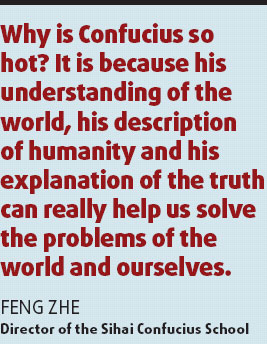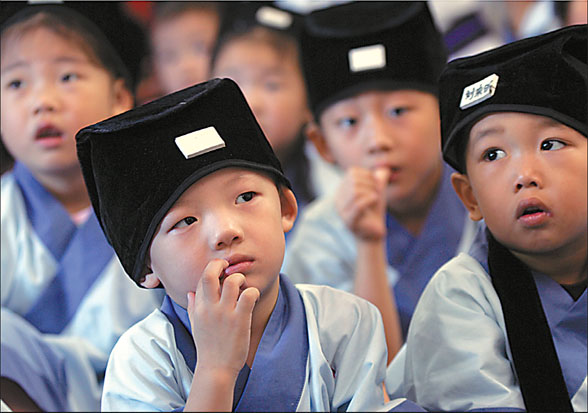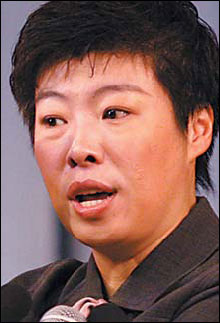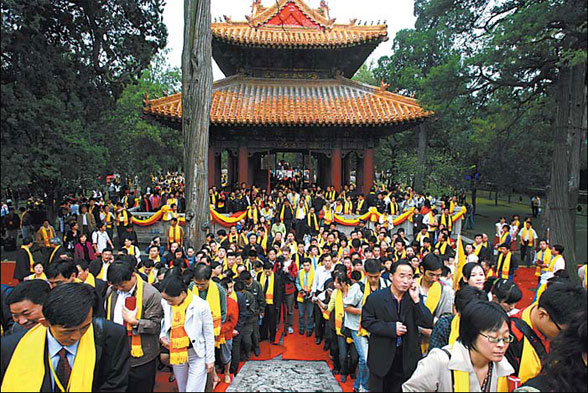The Confucius craze
|
Kids from Nanchang, Jiangxi province, dress up in traditional costumes during an event of reciting works of Confucius. Zhou Chao |
According to a survey by the Chengdu Commercial Daily, the top-selling Chinese writer of 2007 was Guo Jingming, a post-1980-born pulp fiction writer, while the second went to Yu Dan, a woman professor from Beijing Normal University whose Notes on The Analects of Confucius has sold millions of copies.
Yu's book was based on her lectures, The Analects of Confucius on CCTV, a great TV hit of 2006. While Yu contributed to the ongoing Confucius craze, she also benefits financially from it. The Chengdu Commercial Daily estimated her royalty from Notes on The Analects of Confucius to be nearly 7 million yuan ($980,000).
|
Yu Dan, professor from Beijing Normal University, gains great popularity for her Notes on The Analects of Confucius. Dai Wenxue |
Aside from Yu's book, Confucius, the Chinese philosopher and educator who lived from 551 BC to 479 BC, is being revived in many other aspects of Chinese society.
In July 2007, as 70 young people were about to embark on their career as middle school teachers in Chongqing, they swore before a statue of Confucius to "be worthy to be called teachers, to adhere to morality and to teach according to the students' aptitudes."
In the second half of 2007, Peking University professor Li Ling took a journey following Confucius' traveling route to various states of the Spring and Autumn period (770BC-476BC), in order to understand the philosopher's experience in promoting his doctrine.
At the Hanjin Prison in Hubei province, a 5-m-high statue of Confucius has been erected, and his sayings such as "learning without thought is labor lost; thought without learning is perilous" and "when I walk along with two others, they may serve me as my teachers" are written on the wall.
"Why is Confucius so hot? It is because his understanding of the world, his description of humanity and his explanation of the truth can really help us solve the problems of the world and ourselves," says Feng Zhe, director of the Sihai Confucius School.
Located in the outskirts of Beijing, the Sihai Confucius School is an elementary school that specializes in Confucianism and other Chinese classics.
"I sent my child to study at the school to read the classics of ancient sages, because I want him to be useful for the country and society," says Dong Zhenling, a mother of a student at Sihai Confucius School.
But it's not just scholars and students that are studying Confucianism. Tan Jingwei, a 32-year-old security guard trainer in Beijing, spent six years writing a book titled An Ordinary Person's Interpretation of The Analects of Confucianism, and gave a speech about his experience at Peking University recently.
"When I train new security guards, I often tell them about Confucius's saying, 'not to do to others as you would not wish done to yourself'. This is tolerance. If you tolerate others, others will tolerate you too. This way the human relations will certainly be harmonious," Tan says.
Standing for benevolence, ritual, and propriety, Confucianism has been the dominant Chinese ideology since the Han Dynasty (206 BC- AD 220) but was challenged in the 20th Century.
During the May 4th Movement in 1919, Confucianism was criticized by many as an obstacle to the modernization of the Chinese society. During the "cultural revolution" (1966-76), Confucianism was denounced as representative of feudal culture and many Confucian temples were ruined.
So why is there a revival of Confucianism now? Wang Zhongjiang, deputy director of China Confucian Society, believes that it has to do with cultural identity.

"We are not only economical people, but also cultural people. Chinese people naturally want to search for cultural identification," says Wang.
As the economy develops, China is also exporting its culture to the world. By the end of last year, there were 125 Confucius Institutes worldwide, with 85 being built. These 210 Confucius Institutes are located in 64 countries and regions around the world.
"If you are interested in Chinese culture, Confucianism is something you must study," says Daniele Massaccesi, who comes from Italy and studies Easter Asian culture at Beijing Foreign Studies University. Massaccesi says that the saying that impresses him the most from The Analects of Confucius is: "The subjects on which the Master did not talk, were - extraordinary things, feats of strength, disorder and spiritual beings".
"South Korea is probably the country who respects Confucius the most in the world," says Kim Jae Hyun, an MBA student at Peking University. "In South Korea, we feel that Confucius is always with us, for his thoughts can be found everywhere in the society."
As Confucius becomes a hot topic, some people have expressed different views. On Us, a CCTV talkshow program, there was a topic for debate titled Confucius in My Mind on the value of Confucianism in today's society.
Huang Jian, author of Gate of Thoughts (Sixiang Men), a book of reflection on ancient Chinese thinking, believes that the traditional concepts of Confucianism should be discarded.
"Through centuries, our interpretation of Confucius has been sanctified. Now humanity has become the most important value of the society, and we should see Confucius from a human point of view," Huang says. "Chinese people have paid a great deal for the engrained malpractice of Confucianism."
Huang's opinions are rejected by some scholars. Ge Rongjin, a professor from the School of Chinese Classics, Renmin University of China, believes that Confucianism is still relevant today.
"Confucianism has both its positive and negative sides, but it has been adapting to the society," Ge says. "People have been always interpreting it according to the spirit of society. Confucianism is an open philosophy. This is its vitality."
Du Wei-ming, a professor of Chinese history and philosophy from Harvard University, believes that the Confucian doctrine of the mean is always a developing course in which it finds balance and harmony.
"An image of personality of this doctrine can be a reference for people of any time, and it can also be an inspiration of mankind's development," says Du.
|
People from around the world gather at the Confucius Temple to worship Confucius in Qufu, Shandong province. Luo Bo |
(China Daily 02/27/2008 page18)

















